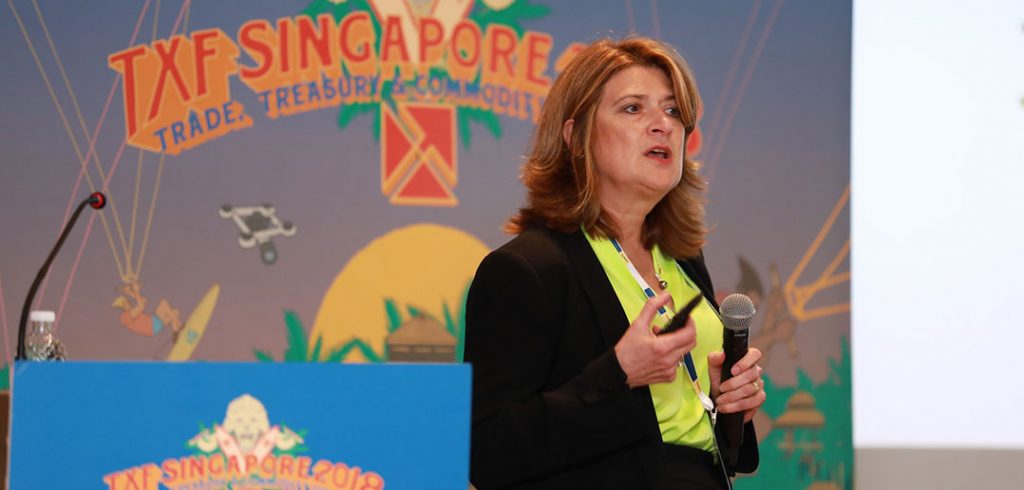“It’s important to reinvent yourself, and I’ve done that multiple times,” she says. “I’ve crossed industries and I’ve crossed disciplines. You have the basics; it’s just a little bit of a different focus. It all boils down to being willing to explore and not being afraid of the unknowns.”
After earning a Ph.D. in economics from Fordham’s Graduate School of Arts and Sciences in 1986, Glasser taught at Rutgers and Bentley for a bit before deciding to go into industry. Since then, she’s worked at some of the biggest organizations in finance, consulting, tech, and even the public sector—Merrill Lynch, KPMG, IBM, JPMorgan, and the U.S. Treasury Department. From the beginning, she says, it was her holistic approach to analyzing and solving problems that made her effective.
“Very early on during my first job at Merrill Lynch, I started getting launched into areas that needed help. I was involved with change management, which can be thought of as internal consulting,” she says. “And I think that’s because I think differently, I think more broadly and holistically, which I attribute to my well-rounded experience at Fordham. The emphasis on teaching and ethics and seeing ourselves as part of a larger ecosystem is unparalleled.”
Glasser also appreciated the sense of community at Fordham, something she was happy to continue fostering as a member and onetime chair of the Graduate School of Arts and Sciences Advisory Council and by co-hosting corporate receptions for alumni and students at JPMorgan during her time there.
“It was amazing to find out how many people I worked with were fellow Fordham grads,” she says. “And I also met impressive students. In fact, I met a senior at one of the receptions who became one of my best hires .”
Now her volunteer work is focused on the Fordham University Alumni Association (FUAA) and its new lifelong learning task force, which she leads.
“The fact that the FUAA is University-wide is critical,” she says. “I want to connect people across campuses and schools. We’re operating in the digital world now, and all the lines are getting blurred.
“Besides being a social community and a way for people to connect, I want to make the FUAA relevant in our alumni’s lives. Lifelong learning is something they can benefit from, whether people just want to learn something different or they want to retool their careers like I have,” Glasser says. “We’re figuring out how to support our alumni this way.”
Glasser just recently reinvented herself yet again—she’s moving from her home in New York City to Florida, and just a few months ago she joined the Financial Risk Group, a consulting firm that specializes in data analytics and risk management solutions. But she doesn’t plan to be any less involved with her graduate alma mater.
“I just love Fordham people—they’re genuine,” she says. “Fordham really supports their community, so to the extent that I can do a little bit to give back, I try.”
Fordham Five
What are you most passionate about?
Personally, I’m most passionate about traveling and seeing the world. I love learning about different cultures. Professionally, I would say I’m most passionate about data and its importance in all aspects of our lives. I see data as the fourth dimension of my work life: There’s people, process, technology, and data.
What’s the best piece of advice you’ve ever received?
My mom always encouraged me to follow my instincts. She liked to say that you should only worry about what other people think when they start paying your bills. Otherwise you just worry about what’s right.
What’s your favorite place in New York City? In the world?
In New York City, I love Central Park and the Empire State Building’s observation deck. They’re both so calm and peaceful, away from the bustle of the city. In the world, Barcelona. I like the people, the city, and the architecture. Especially Parc Güell, the Gaudi Park.
Name a book that has had a lasting influence on you.
I recently read Endurance: Shackleton’s Extraordinary Voyage by Daniel Bryce. It’s about the incredible expedition that Ernest Shackleton took to the South Pole, and how he became surrounded by ice on his way to the Antarctic Peninsula. He and his crew were shipwrecked for close to 1 1/2 years, fighting for survival. I recently returned from a monthlong trip to Antarctica, so I can only imagine how difficult it must have been for Shackleton to motivate and inspire his crew as they beat the odds. His leadership and compassion, including his incredible courage, faith, and desire to keep his men alive in harsh conditions, was instrumental in saving their lives. It is an inspiring story of perseverance, as good as any motivational or leadership book that I have ever seen.
Who is the Fordham grad or professor you admire most?
Joseph Kiernan, who was one of my professors when I was an undergraduate at Fairleigh Dickinson. He really opened my eyes up to economics and told me I had an aptitude for the subject. He got his M.A. and Ph.D. in economics from [Fordham] in 1976 and 1980, and he encouraged me to apply for a graduate assistantship at Fordham so I could continue in an area where I probably wouldn’t have otherwise. If it weren’t for him, my life would be very different.
Learn more about the Fordham University Alumni Association and see who else is on the FUAA Advisory Board.

